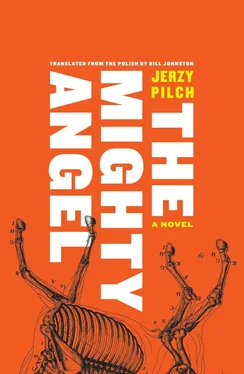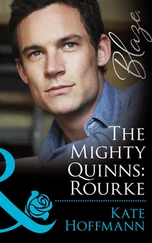“It’s impossible to rub your face in the same snow twice. It’s impossible, but maybe, goddammit, it is possible!”
He stands in the same place, and sets off down the same swept path toward the woodshed, and with the same movement he takes hold of the ax. The wooden door of the stable opens and closes, and now there is a terrifying silence. A minute, two, three, five minutes of terrifying silence and then, maybe close by or maybe far away, there comes a single dull thud, perhaps a horse’s hoof striking the ground, perhaps a pine tree splitting open on the distant slope of Ochodzita Mountain. More silence, several more seconds of silence, then immediately there comes a diabolic percussion and the stable door opens, a drum-roll sounds, someone tries to play an out-of-tune violin, someone hammers iron on iron, there is mad laughter and howling, and a cry from my grandfather, Old Kubica. He’s standing in the door of the stable; his white shirt and black vest are covered in blood. In one hand he grasps a torch; the other, raised to his shoulder, is holding up the severed head of Fuchs the chestnut mare. And he sets off walking; his pace quickens, he’s walking ever faster, he runs, he stumbles as he is running, and traces of blood and fire mark his faltering steps. Then all that can be seen is the flickering light of the torch climbing ever higher up the steep hillside. The wood must be burned, and the snow must be burned, and the world must be burned. And a moment later a fire, a great fire is upon the snow-covered mountains, it’s as if a single drop of blood has fallen from an angel’s wing. You’re not here, you’re not here, you’ll always be gone. On the lake, on the lake, there swims a white swan.
Chapter 23. Intense Emotions by the Utrata River
SHIVERS ZIGZAG THROUGH our bodies. We’re sitting on a stone bench by the Utrata River. I say: The Mill on the Utrata; you say: The Mill on the Lutynia. The pair of us are lifted straight from a pastoral eclogue. It’s muggy; every hour there are violent downpours. We stand up and enter ever deeper into the dark woods. You visit on Sundays. Around eleven I wait by the hospital gates; you step out of the local train and run down the platform. (She’s here.) A sandy path between the dormitories of the insane leads down to the Utrata. I place thick layers of the week’s Gazeta Wyborczas on the bench; we have our whole life before us, a whole seven hours, and a whole life can’t be spent on bare stone.
The last addiction from my previous sojourn on this earth is that I buy Gazeta Wyborcza every day, at the kiosk outside the ward, and read it, or rather leaf through it impatiently. What’s going on in the outside world? Nothing is going on. People are dying.
The dead are strolling through the untended gardens. Their tongue is inhuman and their movements too; only their white-and-blue hospital pajamas give them a semblance of personhood. We walk along the fence; from the other side one of the dead approaches, jerkily proffers his hand through the iron railings, and exclaims in English:
“How do you do?”
“I’m fine, thank you,” I respond automatically.
His face suddenly lights up; the cadaverous expression of a man who has died from excessive pain gives way to the animated, intelligent physiognomy of an emeritus professor of physics or genetics.
“Tell me, please,” says the resurrected one in a clear and bright voice, “What’s been happening in Poland? What’s been happening in the world? What’s the latest news?”
“Nothing in particular,” I reply, embarrassed, as is natural in my position. “I don’t know much, just what’s in the papers.” I show him my pile of Gazeta Wyborczas . “What’s the latest news? I’ve no idea what you’re interested in. . France won the European Championship, a big passenger plane crashed, Wałęsa doesn’t stand a chance in the elections. .”
“How do you do!!” cries the other man in an inhuman voice; his face turns gray and once again becomes a death-mask conveying fearful suffering. He shakes my hand vigorously; then you and I quicken our pace, and behind me I can still hear the clear and bright voice:
“Tell me, please, what’s been happening in Poland? What’s been happening in the world?”
We’re alone, completely alone, and so it can be said: this is the summer of life, this is the only season in which the most secret intentions are carried out. We enter deep into the dark woods; schizophrenics and suicides pass us by, the path comes to an end, the sky darkens, we’re walking up to our waists in wet undergrowth, we embrace like no one on earth ever embraced before. Lord, I’m learning freedom at her side; my heart is learning to beat, I breathe, I exist, because she exists. What kind of problem is a jacket tossed down in the wet grass? What kind of problem are damp wrinkled pants? What kind of problem is it to walk barefoot, and to step barefoot onto a local train? Come on, come on, now let’s go on like this. A raindrop and the shadow of a leaf falls on your skin. I’ve stopped being afraid. Someone inside me has stopped being afraid. He’s not afraid. He’s not afraid that here, where we embrace madly, an unpredictable lunatic will suddenly appear, or that we’ll be tracked down by a posse of she-therapists. I’m not afraid of the coming week because I know that in a week’s time I’ll see her running down the platform; I’m not afraid of the coming life because I know she’ll be there till the end of that life. I’m not afraid of the nightmare in which my grandfather Kubica is running — a severed horse’s head on his shoulder, his clothing covered in blood, a burning torch in his hand — with the intention of setting the frozen woods on Ochodzita Mountain alight. I can still hear the tongues of flame, but I no longer feel fear. Someone inside me is not afraid of the greenish oceans of Bison Brand, the brown lakes of Żołądkowa Gorzka, nor of the transparent rivers of pure spirits — he has already reached the shore.
I’m not afraid of unwritten books, I’m not afraid of sitting in the quiet room in the pale dawn of the ward and writing the last sentences of my epic poem in prose which shows irrefutably that the narrator has been saved by love. I didn’t plan such a very happy plot twist.
“I love you, but I didn’t plan to,” you said, and raised your eyes above the Utrata and higher still, above the woods and the trembling air over Okęcie airport.
“So what did you plan?”
“My intention was to check out your unwittingly praised abilities.”
“And after you’d done that?”
“After I’d checked them out I was going to release you.”
“You’re speaking my language.”
“No, you’re speaking my language.”
“In that case who’s speaking now — you or me?”
“Us, we’re speaking. I’d never have thought the plural could be such a turn-on.”
“I never planned this love either; to be honest, I intended. . Oh, it’s all the same what I intended.”
“You’re not just speaking my language, your intentions are the same as mine.”
“Now I have serious intentions; before, though, I was worried, I was afraid.”
“What were you afraid of?”
“I expected, actually I was pretty much certain, that you’d fall in love with me, and that once again I’d be facing the arduous and disagreeable ritual of getting rid of someone.”
“I was the one who was certain you’d fall in love, and that I’d have the ritual problems once again.”
“I warned you. Watch out, I said in our very first conversation; watch out, this is too much for you. I took you for an impetuous young lady.”
Читать дальше












